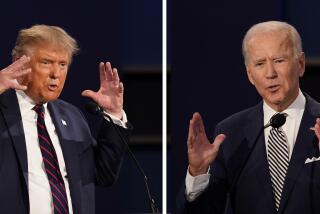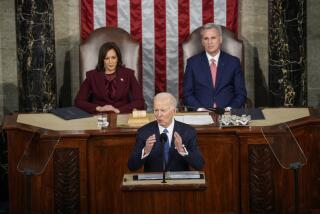Bush Speech to Address War, Economy
- Share via
WASHINGTON — Facing an array of fresh challenges in the foreign policy arena, President Bush on Wednesday will deliver what the White House called a “significant” speech on the war on terrorism and the economy.
Scott McClellan announced the uncharacteristic scheduling change while the president was headed for a day of campaigning in Iowa on Monday.
Bush will still appear Wednesday in Wilkes-Barre, Pa., as scheduled, but his speech will no longer focus on curbing medical malpractice lawsuits, one of his favorite topics and one that often elicits more sustained applause than any other domestic initiative on the campaign trail.
Rather, “he will talk about the two biggest priorities facing America,” said Scott McClellan, the president’s spokesman.
The new speech was given such high priority that it was still being written on Tuesday evening. The president may not put the finishing touches on it until this morning, one senior administration official said.
“What you can expect is not any new proposals, but sharper contrasts on the big priorities, sharper distinctions,” he added. The speech also is intended to “set the course for next few days and on.”
Among the contrast Bush intends to draw are his differences with Democratic candidate, Sen. John F. Kerry, on healthcare.
On the campaign trail, Bush often has linked the underperforming economy to the 9/11 terrorist attacks, most recently in Clive, Iowa on Monday, when he told several thousand supporters: “Those attacks cost us a million jobs during the three months after September the 11th.”
Bush’s decision to turn the spotlight back on the war on terrorism came just days after the first presidential debate, which was dominated by the Iraq war. In the days since Thursday’s debate, even many of Bush’s supporters have conceded that he was outperformed by Kerry. The president’s many peevish facial expressions during the debate — while the senator was speaking — also have been widely panned.
Although the second Bush-Kerry debate this Friday is expected to focus more on domestic issues, Bush’s speech comes amid a flurry of high-profiled developments related to the Iraq war and the global campaign against terrorism.
On Wednesday, a top U.S. weapons inspector, Charles A. Duelfer, is scheduled to issue a report concluding that Saddam Hussein did not possess weapons of mass destruction, which was Bush’s original justification for the Iraq war.
And on Saturday, two crucial elections are to take place, one in Afghanistan, and the other in Australia, where Prime Minister John Howard faces a close re-election campaign.
Also this week, the White House found itself on the defensive after L. Paul Bremer, the former administrator of the U.S.-led occupation government in Baghdad, admitted that the U.S. had committed major mistakes in Iraq.
In a speech in White Sulphur Springs, W.Va., on Monday, Bremer said the U.S. had failed to deploy sufficient troops to Iraq and failed to quell the violence and looting that erupted immediately after the “regime change” in Baghdad.
At the same time, Defense Secretary Ronald H. Rumsfeld admitted in New York on Monday that he had seen no “strong, hard evidence” linking Al Qaeda and Saddam Hussein — another of Bush’s rationales for attacking Iraq.
Both the White House and the Bush campaign, using near identical words, deflected questions about Bremer’s statements, saying that the president always looks to his military commanders and to Rumsfeld on troop needs.
“And Ambassador Bremer himself has also repeatedly said that he is not a military planner and that when the issue of troop levels arose, he deferred to military commanders in the field for those decisions,” McClellan said.
Asked about Rumsfeld’s remarks, McClellan reiterated Bush’s oft-stated contention that there was a link between Iraq and Al Qaeda, telling reporters at a morning briefing that there were “clearly ties” between Hussein and the terrorist network.
McClellan also pointed reporters to a statement Rumsfeld issued Monday night, saying that he “regrettably was misunderstood.” In that statement, Rumsfeld also said: “I have acknowledged since September 2002 that there were ties between Al Qaeda and Iraq.”
The independent 9/11 commission indeed had found ties between the two, but it uncovered no connection between Iraq and the 9/11 attacks.
Also on Tuesday, the Bush campaign unleashed two new television commercials criticizing Kerry — and implicitly, his vice presidential running mate, Sen. John Edwards — for their ties to the trial lawyer lobby. Edwards made a fortune in North Carolina as a personal injury lawyer before he won his Senate seat.
In one ad, a narrator says “frivolous lawsuits” are forcing maternity wards to shut down and pushing obstetricians out of practice. “John Kerry and the liberals in Congress side with the trial lawyers,” the narrator says. “They opposed legal reform 10 times.”
A second Bush ad blamed “out-of-control personal injury trial lawyers” for forcing “good doctors” out of business.
The Bush campaign cited some anecdotal reports of maternity ward closures to back up its broad claims and a statement from the American College of Obstetricians and Gynecologists on the “medical liability crisis.”
Democrats disputed the evidence and said the problem was not as severe as Bush claimed.
In Congress, both Kerry and Edwards have opposed various Republican-drafted bills to cap medical liability. But the Democrats say the Republican bills would gut patients’ rights. They charged that the real problem facing patients is Bush’s indifference to the growing ranks of the uninsured and reluctance to take on the insurance industry.
The president stayed out of the public limelight today. At the White House, he received his daily intelligence briefings, held a regularly scheduled meeting with Rumsfeld, and then did some debate preparations.
Bush also spoke by telephone with the new prime minister of Hungary, McClellan said. He said he expected the president to watch the vice presidential debate in the evening.
Times staff writer Nick Anderson contributed to this story.
More to Read
Get the L.A. Times Politics newsletter
Deeply reported insights into legislation, politics and policy from Sacramento, Washington and beyond. In your inbox three times per week.
You may occasionally receive promotional content from the Los Angeles Times.










